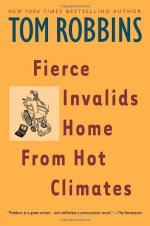|
This section contains 2,573 words (approx. 9 pages at 300 words per page) |

|
Switters considers himself to be a "free man," as in the Hindu quotation that opens the first part of the book. When Maestra accuses him of not liking animals, he denies it, saying, "It's cages I dislike. Cages and leashes and hobbles and halters. It's the taming I dislike . . . domesticity shrinks the soul of the beast." To Switters, dogmatism is the same as cages, leashes, hobbles, and halters. He refuses to be bogged down in absolutes. Robbins uses Switters, a selfstyled "absurdist," to illustrate both the conflict between good and evil and the quest for enlightenment central to the book.
When approached from a dogmatic perspective, Switters easily could be viewed as a drug-using pederast who disrespects the sanctity of a nun's vocation. But Switters has rules about drug use, and in a confused manner, about women as well.
First, he sees there are drugs that expand one's...
|
This section contains 2,573 words (approx. 9 pages at 300 words per page) |

|



